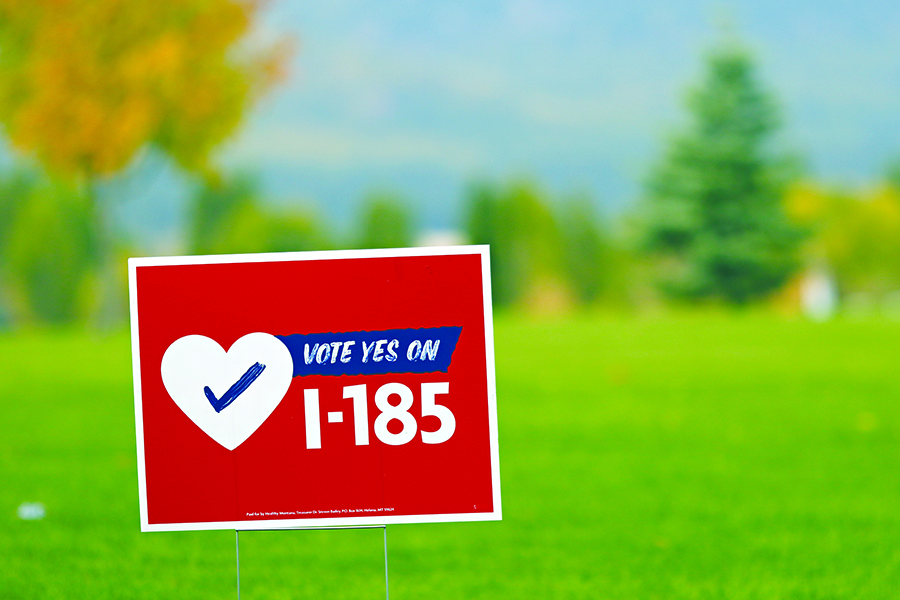Initiative 185: Raise tobacco taxes to fund health care programs, Medicaid expansion.
No: 53 percent
Yes: 47 percent
Why it matters: The failure of I-185 means Medicaid expansion, which is slated to sunset next year, will be a major focus of the 2019 legislative session in Helena.
Despite wide support from local chambers of commerce and the medical community, including officials from Kalispell Regional Healthcare and North Valley Hospital, I-185, an initiative that would have raised tobacco taxes to fund Medicaid expansion, failed to pass on Nov. 6. That means Medicaid expansion will become one of the hottest topics when the newly elected Legislature arrives in Helena come January.
I-185 would have increased the tax on a pack of cigarettes from $1.70 to $3.70 and would have raised $74.3 million in revenue by 2023 to fund health-care programs and Medicaid expansion, which is slated to sunset in 2019. However, the tobacco industry funneled millions of dollars into a campaign against it, with one company alone spending $12 million on ads.
Dr. Jason Cohen, chief medical officer at North Valley, said he was “disappointed” that the initiative failed not just because it would have secured Medicaid expansion but also because it could have helped persuade people to quit smoking. Cohen referenced statistics that every time the price of a pack of cigarettes increases fewer people pick up smoking.
“Taxing tobacco saves lives,” he said.
In a statement to the Beacon, Gov. Steve Bullock said reauthorization of Medicaid expansion during the next legislative session would be a “high priority,” although he admitted it might be a challenging battle.
“The fight to protect healthcare for 100,000 Montanans isn’t over and we won’t give up,” Bullock said. “There’s too much at stake.”
Initiative 186: Require the denial of a permit to any new hard-rock mine “unless the reclamation plan provides clear and convincing evidence” that the mine would not require perpetual treatment of polluted water.
Why it matters: Failure of I-186 removes a potential hurdle to opening up two proposed mines in Northwest Montana.
No: 56 percent
Yes: 44 percent
While the tobacco tax received much of the attention statewide, residents of Lincoln and Sanders counties were keeping a close eye on Initiative 186. If passed, the initiative would have required the Montana Department of Environmental Quality to deny hard-rock mine permits to any operation that failed to provide “clear and convincing evidence” that the mine would not require perpetual treatment of polluted water after the mine closed. Proponents of the initiative said that the new law would have protected the state’s waterways and would not impact any mine that was already open. But opponents said it would cripple the mining industry.
Luke Russell, vice president of external affairs for Hecla Mining, said his company was pleased that Montana voters shot down the proposal. Hecla is currently trying to develop two different mines in Northwest Montana: The Montanore Mine near Libby and the Rock Creek Mine near Noxon.
“The failure of I-186 removes another obstacle to opening our two mines,” Russell said.
While the Rock Creek Mine has received the green light from federal officials, Hecla is currently caught up in a lawsuit with the state of Montana over an effort to label CEO Phillips S. Baker a “bad actor.” If the state is successful in labeling Baker a bad actor due to his role in a previous mine that required extensive cleanup, Hecla would not be able to develop either mine while the CEO is in power.
Legislative Referendums
While the two initiatives on the Nov. 6 ballot failed, the two legislative referendums fared better.
Legislative Referendum 129 was approved by 62.64 percent of voters and prohibits people from collecting other people’s ballots, with certain exceptions. Supporters of the practice state it helps people who might otherwise have trouble getting to the polls before Election Day. LR-129 was first introduced by Kalispell Republican Sen. Albert Olszewski during the 2017 legislative session. The ACLU of Montana came out against the measure and argued that it put up a barrier to voting. Individuals exempt from the ban include election officials, postal service workers or others authorized to transmit mail, caregivers, family members, household members and individuals known by the voter.
Legislative Referendum 128 was approved by 62.54 percent of voters and will levy a six mill tax on all real estate and property subject to taxation to support the Montana University System. The six-mill tax is equivalent to $6 for every $1,000 of a property’s taxable value. The act will go into effect on Jan. 1 and terminate in 2028. Similar legislative referendums have passed every decade or so. The measure is expected to provide Montana universities $20.9 million in fiscal year 2020 and $21.5 million in fiscal year 2021.
